汽车后视镜罩的注塑模设计(含CAD零件装配图,PROE三维图)
无需注册登录,支付后按照提示操作即可获取该资料.
汽车后视镜罩的注塑模设计(含CAD零件装配图,PROE三维图)(任务书,开题报告,中期检查表,外文翻译,论文说明书9600字,CAD图9张,PROE三维图)
摘要:模具工业是当今世界上发展最快的工业类别之一,注塑模具更是其中的佼佼者。因此,研究注塑模具,了解塑料制品的生产工艺,提高塑料产品的质量,具有重要的意义。
此次毕业设计课题汽车后视镜罩的注塑模设计,主要介绍了注塑成型的基本工艺,并提出了注塑成型产品的基本设计原则,注塑件的成型工艺设计、注塑机的选型、浇注系统的设计、注塑件的结构设计。脱模顶出机构设计,冷却系统设计过程。并对标准模板的选择作了相应的介绍。通过这个设计,掌握了注塑模具设计的整个过程,也提高了使用CAD/CAM绘制复杂装配图和三维软件使用的能力。
关键词:汽车后视镜罩;注塑模;结构设计;PROE;
Injection mold design of rear view mirror cover
Abstract: The mold industry is one of the fastest growing industrial categories in the world today. Injection molds are the best. Therefore, it is of great significance to study injection molds, understand the production process of plastic products, and improve the quality of plastic products. The subject of the design is the injection molding of the rearview mirror cover. The project focuses on the basic process of injection molding, and puts forward the basic design principles of injection molding products, the molding process design of injection molding parts, the selection of injection molding machines, and the pouring system,the design of the structural injection molded parts, stripping ejection mechanism design, cooling system design process. It also made corresponding introduction to the selection of the standard template. Through this design, the entire process of injection mold design has been mastered, and the ability to use CAD to draw complex assembly drawings and 3D software use also improved also has been improved.
Keywords:Car rear-view mirror cover,injection mold,structural design,PROE
塑件结构工艺性及材料选定
2.1 塑件的几何形状分析
后视镜是汽车最重要的外观组件,整体要求流线美观,是驾驶员在驾驶时的第二个眼睛;本次设计的后视镜罩的形状非常规则,并且尺寸精度要求不是很高。因此,经过仔细考虑,本次设计选型的精度等级为13级。
2.2 塑件材料的选择
本设计塑件材料选用ABS树脂材料。
ABS,英文全称为:acrylonitrile-butadiene-styrene copolymer;中文全称为:丙烯腈-丁二烯-苯乙烯共聚物;ABS是在聚苯乙烯树脂基础上发展起来的一种新型工程材料[1]。
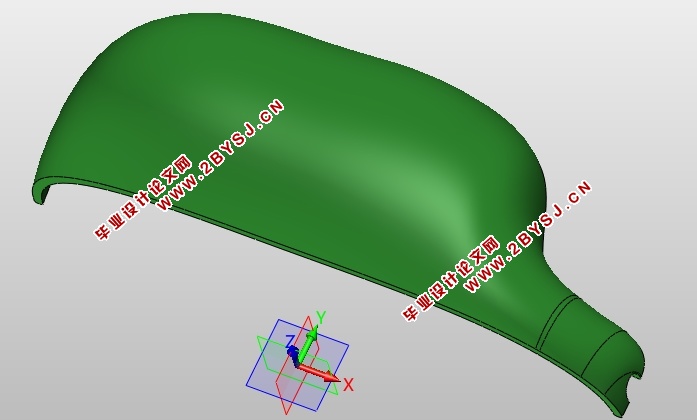
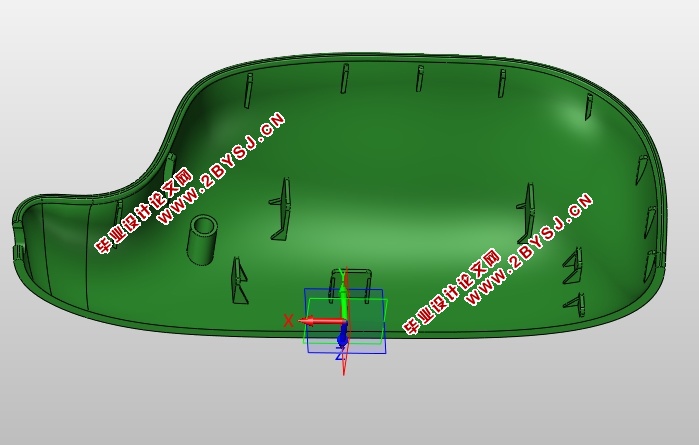
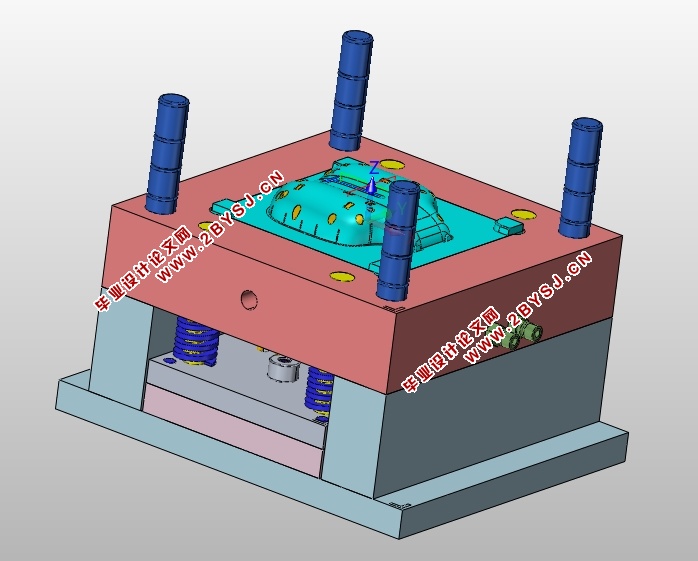
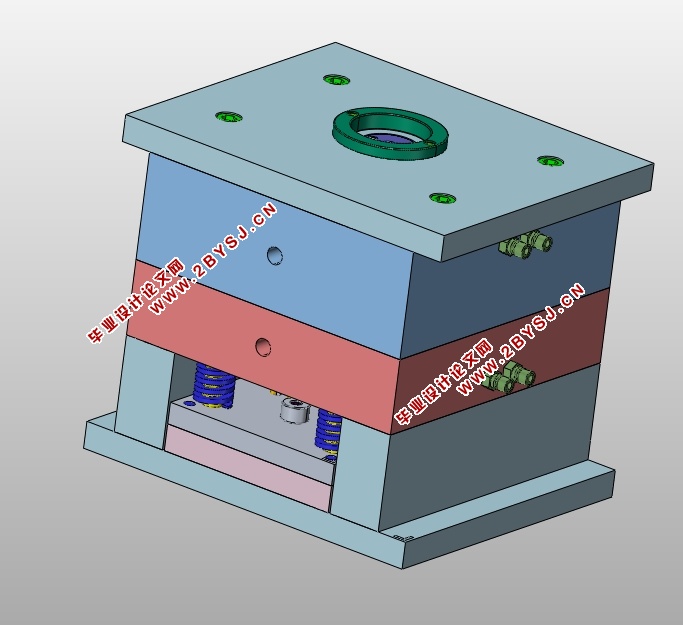
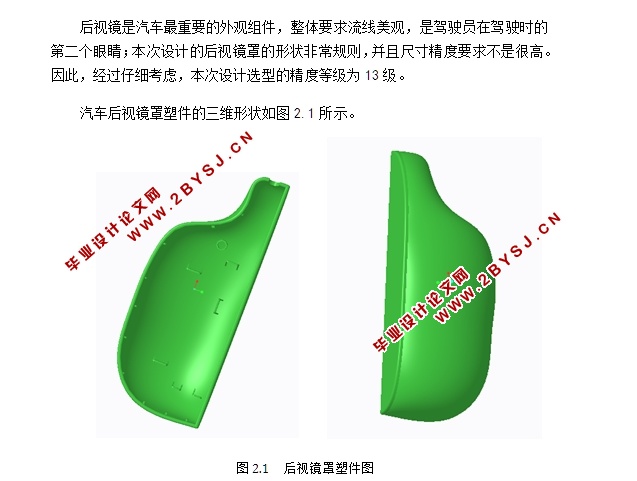
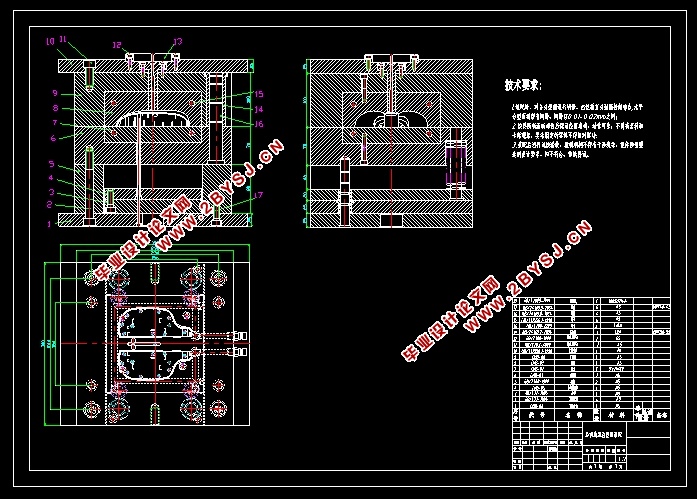
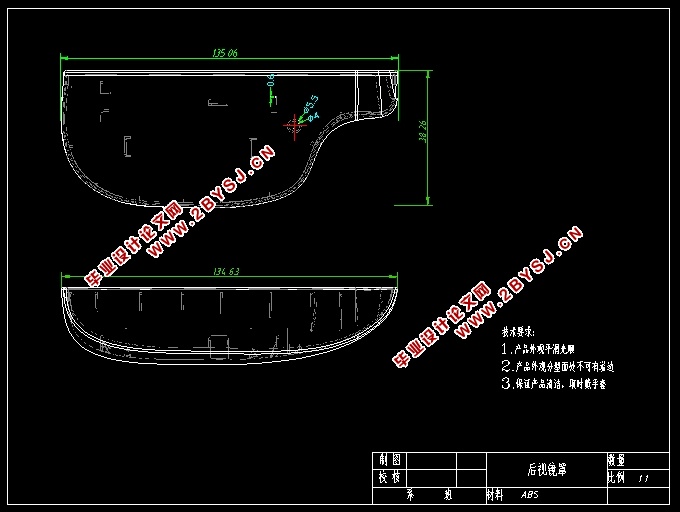
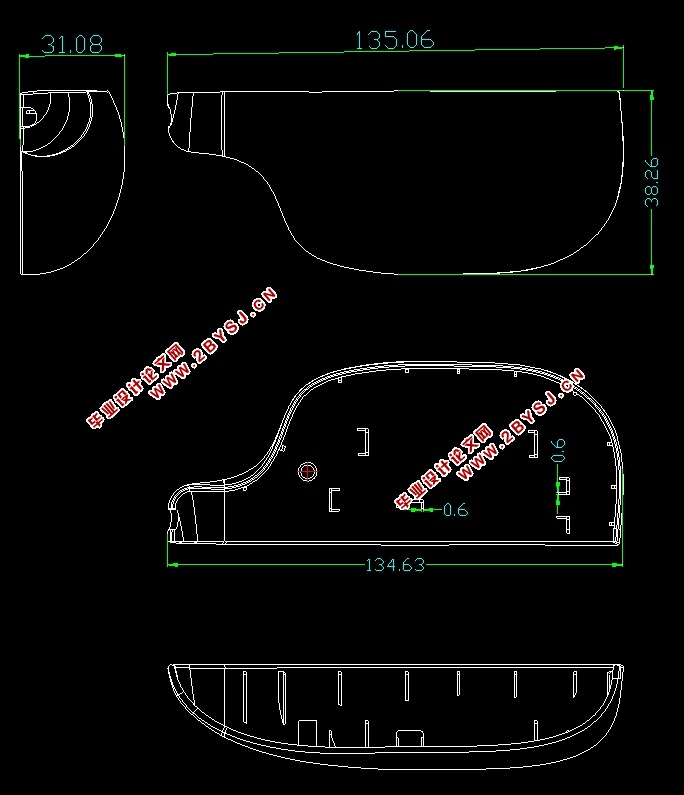
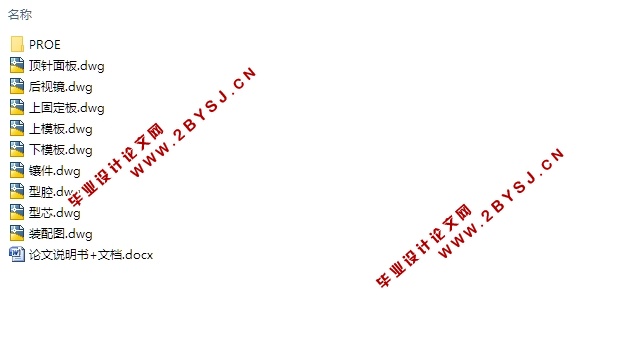
目 录
摘要 I
Abstract II
1 绪论 1
1.1 课题研究的目的和意义 1
1.2 国内外发展现状 1
1.3 我国模具的总体发展趋势 2
2 塑件结构工艺性及材料选定 3
2.1 塑件的几何形状分析 3
2.2 塑件材料的选择 3
2.2.1 ABS材料特性如下 3
2.2.2 ABS材料的主要技术指标 4
2.2.3 ABS材料的成型特点 4
2.3零件的体积估算及注塑机型号的选择 4
2.3.1注塑机特点 4
2.3.2 注射量的计算 4
2.3.3 注塑机参数选定 5
2.3.4 锁模力计算 6
2.4注塑机校核 6
2.4.1注塑机压力校核 6
2.4.2锁模力校核 6
2.4.3成型腔数的确定 6
3注塑模具主体结构设计 9
3.1型腔布置及分型面的选择 9
3.1.1型腔数量及排列方式 9
3.1.2模具结构形式的确定 9
3.2 浇注系统 10
3.2.1 主流道设计 10
3.2.2 分流道的设计 11
3.3.3浇口的设计 12
3.3.4冷料穴和拉料杆的设计 12
3.3成型零件的设计 13
3.3.1 分型面的选择 13
3.3.2 排气槽的设计 14
3.4成型零件的结构设计 14
3.4.1型腔的结构设计 14
3.4.2 型芯的结构设计 15
3.4.3 成型零件的尺寸计算 15
4注塑模具其他结构设计 19
4.1导向机构设计 19
4.1.1 导向机构设计原则 19
4.1.2 导柱导套的选择 19
4.1.3 导柱导套的排布方式 19
4.2 塑件脱模机构设计 20
4.2.1 推出机构的设计 20
4.2.2 复位的设计 21
4.2.3 脱模过程 21
4.2.4模架的设计 21
4.3冷却系统的设计 22
4.3.1冷却道开设原则 22
4.3.2 冷却水道的结构 22
5模具的装配 23
5.1模具总装配 23
5.2 型腔、型芯与模板的装配 23
5.3 推杆的装配 23
5.4模具的总装配工艺 24
6 总结 25
参考文献 27
致 谢 29
附录A 英文文献翻译 31
